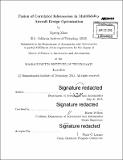Fusion of correlated information in multifidelity aircraft design optimization
Author(s)
Zhao, Zipeng, S.M. Massachusetts Institute of Technology
DownloadFull printable version (18.42Mb)
Alternative title
Fusion of correlated information in multifidelity aircraft design and optimization
Other Contributors
Massachusetts Institute of Technology. Department of Aeronautics and Astronautics.
Advisor
Karen Willcox.
Terms of use
Metadata
Show full item recordAbstract
Models used in engineering design often face trade-offs between computational cost and prediction uncertainty. To ameliorate this problem, correlated models of varying fidelities are used together under different fidelity management strategies to produce accurate predictions while avoiding typically expensive costs. However, existing strategies either account for model correlation and operate under the assumption of a strict fidelity hierarchy, or do not consider model correlation but allow model fidelities to vary across the design space. In this thesis, we present a surrogate-based multifidelity framework that simultaneously accounts for model correlation and accommodates non-hierarchical fidelity specifications. The development of our multifidelity framework can be classified into three stages. The first stage involves the construction of three separate wing weight estimation models that simplify different aspects of the wing sizing problem, thereby creating a scenario where model fidelities are not confined to a rigid hierarchy. The second stage involves the establishment of a formal definition of model correlation, and an extension that allows model correlations to vary across the design space. The third stage involves the incorporation of model correlation in surrogate-based information fusion. To illustrate the application of our framework, we set up a wing weight estimation problem using wing span as design variable. In a later chapter, the problem is extended to two dimensions for increased complexity using body weight and aspect ratio as design variables. Results from both wing weight estimation problems indicate a combination of variance reduction and inflation at different positions in the design space when model correlation is considered, in comparison to the case where model correlation is ignored.
Description
Thesis: S.M., Massachusetts Institute of Technology, Department of Aeronautics and Astronautics, 2015. Cataloged from PDF version of thesis. Includes bibliographical references (pages 117-119).
Date issued
2015Department
Massachusetts Institute of Technology. Department of Aeronautics and AstronauticsPublisher
Massachusetts Institute of Technology
Keywords
Aeronautics and Astronautics.